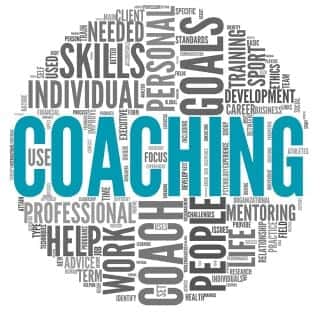There is a lot of talk in businesses about coaching these days, but have you considered hiring a  coach yourself?
coach yourself?
Many people have perhaps given some thought to coaching, but may not have gone on to consider how it might really benefit them or even considered the difference between workplace coaching and coaching for their own personal benefit, their own career/business goals, to get support from a coach to focus on their own personal development. We all want to grow personally and professionally, we are learning all the time, that’s a fact – but could you be taking the inside track? Is there a faster way to get to your goal? Having been coaching for a number of years, it amazes me how many people leave their personal growth fairly far down their to do list. In corporate life many employees except their employer invest in their development, but the reality is that businesses are only ever going to invest in development or training that has a business benefit or return (that’s business, they want ways to improve output, profit, sales etc). However what if you hired your own coach who only had your best interests at heart – who’s only agenda was to support you in any way the could? What if you could shorten the learning curve and tap into your own potential – grow you business faster, climb the career ladder more swiftly, realise the benefits of coaching to get you to your health and fitness goals faster, or simply excel in other areas of your life, how good would that be?
Coaching creates space …
Have you ever stopped to take stock? – often we find ourselves so busy ‘doing’ we don’t pause to consider if what we’re doing is working for us. Do we notice what is working well for us that we want to do more of, or do we review what’s maybe not working so well and take learning from it. It’s about taking a step back. Many of you might do this already, right? – so you may think I don’t need a coach, do I? – however your thinking will be limited by your view on the world, your beliefs, your values – ever found yourself down a tricky rabbit warren and wondered how did I get here, and more to the point how do I get out because I can’t currently see a way? – that’s where new thinking is helpful – and coaching helps you create the space to do this, by asking great questions a coach can help you create new perspectives, ideas, options, possibilities … both conventional coaching and NLP coaching do this, but the NLP toolkit takes coaching and a coaches ability to help their client to a whole new level …
Your Beliefs create your reality & your Values motivate you …
If you don’t believe you can do something, your probably won’t. But this is simply about your thinking … you are limited by your thinking. I find people that say ‘I can’t do that’ and I say, you could, but you’re choosing not to – you can choose a different option if you’d like? Many of us focus on what we perceive to be our short-comings – but they too are distorted because of our view of ourself – which is all connected to our thinking. Our thoughts are connected to how we feel – so there is no surprise that when we change our thinking, we change the way we feel. Perhaps your ‘critical voice’ in your head can cause you problems at times – what if we could get rid of that inner conflict for you? Much of our thinking is automatic (some physiologists say that around 60% of our thinking is reoccurring/habitual) – our thoughts today are very similar to those that we had yesterday. We have auto pilot settings, which means that in a particular setting we typically respond in a similar way – even if that is not helpful – however in NLP we can change the auto setting too. In NLP we look at Values (what motivates us at an unconscious level) – often the challenges people have are because of conflicts between different values they have (e.g. between wanting both freedom and responsibility), or that their values are not aligned behind their goal (and so they are ‘blown off course’ and it’s then a huge effort to get back on track) – in NLP when we change this, your become super charged towards your goal.
Do you want to change some stuff in order to improve your success and results?
The reality is that we’re all coaches (even if it’s informally coaching friends or our children). Conventional coaching is conscious. This is where the challenge is. It uses the logical thinking mind and in my experience whilst coaching consciously can help create some change (I’ve experienced it and coached others in this way), it rarely sort’s the clients problem once and for all (to stop it reoccurring). That’s why many coaches like to have NLP in their toolkit. I use the analogy of conventional coaching being about pushing the rock up the hill (of course there are ways to do it and options and consequences of each option – and yes, it’s useful to think this through if you haven’t before). However what it we could change the thinking that got us to this point – what if we could get rid of the boulder? – that’s how I describe NLP coaching vs. conventional coaching. Do I blend the 2? – of course – I’m a believer of taking the best bits that are in my toolkit and using them to help my client get the result they want – but do I get the same results (as fast, or as successfully) with conventional coaching alone – I think not.
As a Coach to the Coaches, what’s my final thoughts …
NLP is set of coaching tools that I never leave home without (metaphorically!) – and now I have NLP in my toolkit I wish I’d had it when I first started coaching! – this is one of the reasons I’m so passionate about helping other coaches or aspiring coaches to explore how NLP can help them and their clients. NLP gives us options, it gives us choices in how we work with and help clients, and most importantly it gives us a mindset that is taken from the study of human excellence – from advanced listening and questioning skills, to using our language to help bring about change, to the attitude of curiosity, to bringing fun and possibility – and of course a series of techniques that we might choose to use – the techniques that NLP is famous for. I’m also passionate about helping clients/coachees in the best way I can – and often the fastest and most successful way to do this involves something from my NLP toolkit (even when I’m wearing my executive coaching or Myers Briggs Coaching hats!). When I’ve designed and delivered Coaching courses, I’ve always taken the best bits that I’ve got in my toolkit, but most importantly I focus on teaching people the stuff I know works! (regardless of what label I or anyone else has put on it).
What if you become a certified NLP Coach?
Would you like to become a certified NLP Coach or NLP Master Coach?You can check our our NLP course schedule here – if you’re interested in become a Coach, the best place to start is our NLP Practitioner course (7 days) and then you’ll have the skills to book onto the NLP Coach/Time Line Therapy/Hypnosis Practitioner course (4 days) – when you’ve undertake the 11 days of training you will be an NLP Coach!
How great would your coaching become if you have more tools in your toolkit that helped you get faster and better results for your clients? What if you could move beyond the conventional coaching toolkit and took your skills as a coach to the next level, how great would that be? How would it be if you could take any problem a client had and knew you had something in your toolkit that would solve it? (yep, I’m that confident about NLP Coaching)


